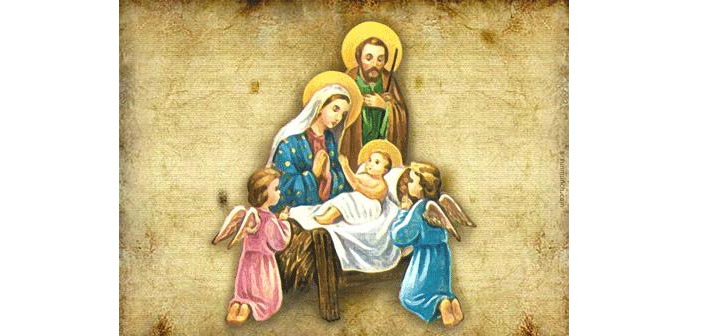On the occasion of Surp Dzınunt feast, Bishop Sahak Maşalyan assessed the meaning of Jesus Christ's birth in a barn in Bethlehem and its message for the present day.
God is a being beyond
human imagination. However, we have to imagine him anyway, otherwise
we cannot speak about him. Revelation is the way God opens himself to
human understanding in time. Prophets in the Holy Scripture and
ultimately Jesus Christ as the embodiment of God provide us with an
image of God whom we can believe, obey and be devoted. This image is
so important that it defines the ideals of humanity of religious
individuals and civilizations. If we make up a saying like “Man is
known by the God he believes”, we could shed a light on
contemporary debates on religion, since any social psychological,
anthropological and cultural analysis would conclude that the most
perfect being and characters in a religion will be ultimately
reflected in the followers of that religion one way or the other.
Wars of religions and sects and religious terrorism are fundamentally
related to the image of God in people. There are images of God
blessing life and praising, ennobling and protecting humanity and
there are also destructive images of God generating a culture of
death and downgrading people. Where would a blood-thirsty God lead
its followers to?
Messages of the birth of Jesus Christ
Christian theology considers the events that took place during the birth of Jesus Christ as theophany. It is believed that those weren't coincidental events; rather, they were divine choices aiming to convey universal messages to humanity. According to the divine plan, Jesus was born in a barn in Bethlehem during a trip and migrated to Egypt as a baby. His birth is the declaration of divine value judgments to humanity with powerful symbols. In fact, Feast of Holy Nativity repeats these symbolic messages in order to remind people God's nature and priorities and soothes them. The birth of Jesus is the most famous and most commonly celebrated occasion in the world. It occupies two months of the Christian calendar. Divine will has chosen to locat it at the center of the history.
Christ's birth is a story of migration and refugee. It is a bitter story despite all of its romantic aspects. Upon the order of Roman Emperor concerning census, Jesus Christ's parents Mary and Joseph had to go to Bethlehem for being registered, which was 100 kilometers away from Nazareth. Traveling is hard for the poor. When they arrived to Bethlehem, they couldn't have found a place to saty. There was no room for them in the inn. And nobody accepted them as guests. When the moment of birth came, only a barn was given to those poor people. The greatest man on earth was about to born there.
A divine protest
Birth of Jesus Christ is like a divine protest against the values of our civilization that excludes love and the human. Christs chose to be born in a barn, rather than in palace or even in an ordinary house. Maybe God wanted to tell us that barns are cleaner and more respectable than our palaces in his eyes. Innocent animals serving to people live in barns, whereas palaces are populated by human-like intelligent creatures who feed on human blood like vampires but look very fancy, elegant and luxurious. People cannot see the loathsomeness under their camouflages. However, God's heart can.
While a saint and an angel were walking on a road, the angel stopped to take care of the corpse of an animal. Being unable to understand the action of the angel, the saint walked away holding his nose. After a short while, they saw a knight. While the saint watched the knight with admiration, the angel walked away holding its nose. The saint asked why and the angel responded: “You can only see the appearance and you are affected by it. On the other hand, we see the inside. That knight was so ambitious and arrogant that I couldn't stand the disgusting odor coming from him.”
God of the poor
King Herod, in fear of losing his power, had all the babies in Bethlehem killed, but Jews of the time were calling him Herod the Great anyway. The holy family was saved from this massacre thanks to the divine timing and went to Egypt. Thus, the life of the savior started as a refugee adventure. The savior has to share a common fate with the ones whom he wishes to save. He chose to start his life journey with the homeless, displaced, refugees and the poor running away from tyranny. The God manifested in Christ had primarily chosen to be the God of the poor. Miracles took place throughout of his birth. He gilded every thing that had been downtrodden with the golden brush of God and the story of the poor became glorious and legendary. The God that opens himself up to us through Jesus Christ is the God who doesn't forget the forgotten ones, who supports, watches and praises the struggle for existence of the poor rather than the fame, power and wealth of the cruel. As Jesus said in one of his preaches: “The Spirit of the Lord is on me, because he has anointed me to proclaim good news to the poor. He has sent me to proclaim freedom for the prisoners and recovery of sight for the blind, to set the oppressed free (Luke 4:18).
Glory of the human nature
Yet, God does not help the poor in the ways we know, since the truths and virtues that humans have to learn are hidden in the harsh reality of this world of test. God wants us to become captains who know how to lead their ships despite the wind and waves. Well, the holy family continued their journey for all that and held onto life. Poverty, torment, homesickness and sufferings didn't discourage them. They had never lost their humanity and faith in better days; on the contrary, they became saints, heroes whom humanity takes as example. With such people, God reminds people the great potential that he bestowed on them. The glory of human nature that is more powerful than torment, suffering, starvation, poverty, ambition, fear and even death shines in the souls of such people. They lead people to God like the star of Jesus Christ that shines in Bethlehem in the darkness of the night.
While we are picturing the ancient story of the birth under the shadow of thousands of years, we sometimes fail to notice the millions who suffer on the roads of migration under our noses. It is true that we cannot make everything perfect for them, but we can act like that anonymous innkeeper who gave his barn for the birth of Jesus Christ. Anything that we can give to the poor of God, any contribution we can make will help the story of the Christmas survive.





